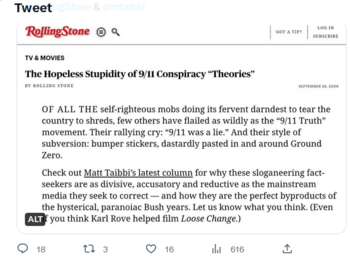Rolling Stone
 | |
| Type | magazine |
| Founder(s) | Jann Wenner, Ralph J. Gleason |
| Founded | 1967 |
| Author(s) | Unknown |
| Local copy | Broken Link: [[{{{local}}}]] |
| Magazine which used to have independent reporting, although it has increasingly fallen under sway of Project Mockingbird | |
Rolling Stone is an American monthly magazine that focuses on music, politics, and popular culture.
Contents
History
Rolling Stone was founded in San Francisco, California, in 1967 by Jann Wenner, and the music critic Ralph J. Gleason. It was first known for its coverage of rock music and for political reporting by Hunter S. Thompson. In the 1990s, the magazine broadened and shifted its focus to a younger readership interested in youth-oriented television shows, film actors, and popular music.[1] It has since returned to its traditional mix of content, including music, entertainment, and politics.
The first magazine was released in 1967 and featured John Lennon on the cover and was published every two weeks. It is known for provocative photography and its cover photos, featuring musicians, politicians, athletes, and actors. In addition to its print version in the United States, it publishes content through Rollingstone.com and numerous international editions.
In 2021 Penske Media Corporation owned Rolling Stone, having purchased 51% of the magazine in 2017 and the remaining 49% in 2019.
The Runaway General
In 2010 Michael Hastings wrote an article about Stanley McChrystal and his staff,[2] whom had considerable disdain for the Obama administration and said so openly in interviews with Hastings. All were under the impression that Hastings would not relate their words in such a direct manner in his article. This led to McChrystal's resignation a day after the online publication.
The Wikileaks Mole
The 16 January 2014 issue of Rolling Stone magazine published a biography of Sigi Thordarson entitled The WikiLeaks Mole – How a teenage misfit became the keeper of Julian Assange’s deepest secrets – only to betray him.[3]
Robert F. Kennedy Jr.

In 2005, Rolling Stone simultaneously with Salon published an article by Robert F. Kennedy Jr., "Deadly Immunity", about corruption in the CDC's vaccine branch. The article was the beginning of the mass censorship of any vaccine information that departs from official narratives: In 2008, Salon removed the article. Rolling Stone removed the article in February 2021.[7]
Important journalists
In popular culture
In Stephen King's novel, Firestarter, the protagonists decide to tell their story to Rolling Stone because it would have been intercepted and stopped by government networks in any other US news outlet (i.e. it was then an independent media outlet, which is not the case today).
Documents sourced from Rolling Stone
References
- ↑ https://web.archive.org/web/20090312094229/http://www.samuelfreedman.com/articles/culture/ust_rolling.html
- ↑ https://www.politico.com/pdf/PPM130_r1109mcchrystal.pdf
- ↑ "The WikiLeaks Mole – How a teenage misfit became the keeper of Julian Assange’s deepest secrets – only to betray him"
- ↑ https://twitter.com/drewholden360/status/1434591443855753220?s=21
- ↑ https://twitter.com/RollingStone/status/1433922442850930696
- ↑ https://pierrekory.substack.com/p/how-to-create-a-fake-news-cycle
- ↑ Robert F. Kennedy Jr. The Real Anthony Fauci, page 142